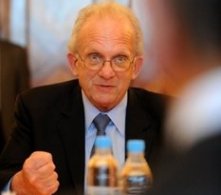 Lebanon criticized the U.S. decision to suspend military aid over concerns that Iranian-backed Hezbollah may have influence over the army, saying Tuesday it was unwarranted and weakens American-backed efforts to build up its national forces.
Lebanon criticized the U.S. decision to suspend military aid over concerns that Iranian-backed Hezbollah may have influence over the army, saying Tuesday it was unwarranted and weakens American-backed efforts to build up its national forces.
The chairman of the U.S. House Foreign Affairs Committee, Rep. Howard Berman ( pictured right) , said Monday he suspended $100 million in assistance to the Lebanese Armed Forces .
Lebanon’s government is an uneasy coalition of a Western-backed bloc, headed by Prime Minister Saad Hariri, and the Shiite militant group Hezbollah, which in just a few years has gained so much political power it now has a virtual veto over government decisions. Hariri’s bloc wants Hezbollah, which is far more powerful than the Lebanese army, to disarm, but does not have the power to force its will.
“The U.S. government is quite familiar with the reliability and importance of the Lebanese armed forces as a central institution in our country’s quest for peace and security and for asserting state authority throughout the country,” Mohamed Chatah, an adviser to Prime Minister Hariri, told The Associated Press. “The last thing that the U.S. or any other friend of Lebanon should do is to weaken the effort to build up our national army.”
He added that government officials were contacting Washington “to make sure that there is a better and fuller understanding of the situation in Lebanon and along the border.”
The Congressman Berman said his concerns about Hezbollah’s influence over the Lebanese armed forces were reinforced a day after he suspended the aid when Israeli and Lebanese army forces clashed along their common border.
Hezbollah and the Lebanese army both insisted the militant group did not take part in the clash, and the State Department said Monday there was no evidence American-supplied equipment had been used by Lebanese soldiers. It said it was not yet clear whether the soldiers involved had received U.S. military training.
The fighting was the worst since 2006 in the area, killing two Lebanese soldiers, a Lebanese journalist and an Israeli officer. It underlined how easily tensions can re-ignite along the frontier where Israel and Hezbollah fought a war four years ago.
There has long been debate over Hezbollah’s substantial arsenal. Israel occupied south Lebanon for nearly two decades following an invasion in 1982 to fight Palestinian forces entrenched in the area.
Since Israel withdrew from south Lebanon in 2000 — removing the main motive for Hezbollah’s armed struggle against the Jewish state — Hezbollah’s opponents in Lebanon have grown bolder in demanding it relinquish its weapons and in criticizing it as a rogue element.
The U.S. has pressed Lebanon to strengthen its army to become the predominant force in the country, but its Western-backed partners do not have the power to force Hezbollah to disarm.
Both the Bush and Obama administrations have backed sending aid to Lebanon’s army, maintaining that a professional military is critical for the government to exert its sovereign authority, which has been challenged by armed Hezbollah militants in the past.
“Until we know more about this incident and the nature of Hezbollah influence on the (Lebanese army) — and can assure that the (Lebanese army) is a responsible actor — I cannot in good conscience allow the United States to continue sending weapons to Lebanon,” Berman, a Democrat from California, said Monday of the suspension in aid.
Since it was founded at the height of Lebanon’s civil war, Hezbollah has grown into one of the most robust, organized and sophisticated resistance groups in the world with a small army of about 6,000 fighters. With an annual budget of more than $100 million largely supplied by Iran, it also runs a network of schools, charities and clinics, and has its own satellite television and radio stations.
State Department spokesman P.J. Crowley defended the U.S. assistance Monday.
“We have an extensive military cooperation program with Lebanon because it’s in our interest to have that program,” he said. “It allows the government of Lebanon to expand its sovereignty. We believe that is in the interest of both of our countries and regional stability as a whole.”
Crowley said he was not aware of plans to reevaluate U.S. military cooperation with Lebanon. AP

Leave a Reply
You must be logged in to post a comment.